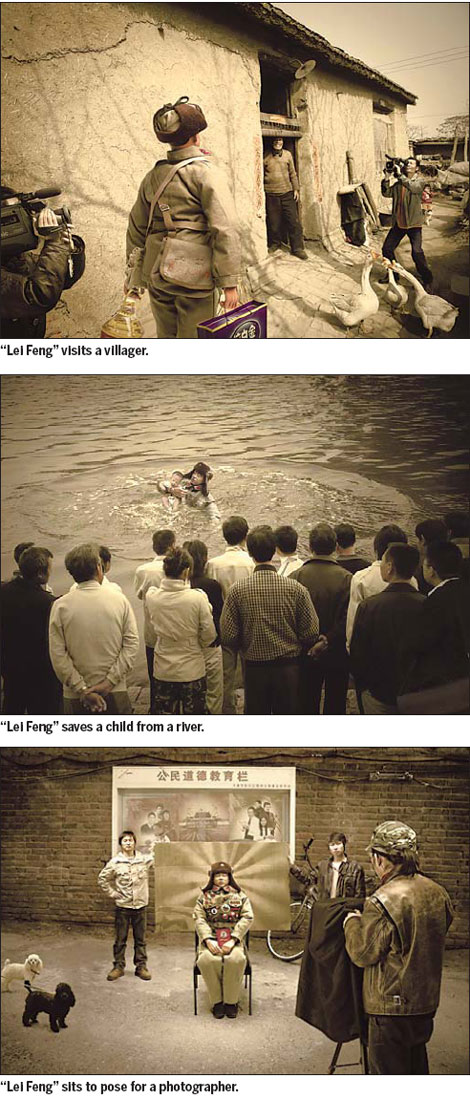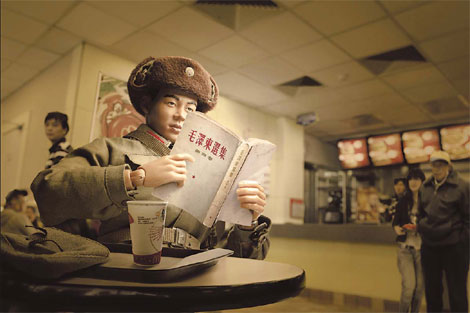Life
New moves for a heroic legendary 'action figure'
By Wang Ru (China Daily)
Updated: 2010-05-24 07:59
 |
Large Medium Small |
|
"Lei Feng" reads a book by Mao Zedong in a McDonald's, in this scene created by artist Dai Xiang. Photos provided to China Daily |
He was a hero for generations of Chinese. His name came to represent the ideals of morality, dedication and sacrifice. He is the symbol of "serving the people".
Lei Feng was a Chinese solider who died in an accident in 1962, aged 22. After his death, Chairman Mao Zedong called on the whole nation to "Learn from comrade Lei Feng".
Lei was a nationwide icon of morality for nearly 50 years and even today, people still describe someone dedicated to helping others as "a living Lei Feng".
But, as with many other memories of harder times, Lei's spirit is fading away as China's fresh generations focus instead on an era of consumerism.
The questions of whether Lei Feng's legacy still exists, coupled with what he would be like if he lived to see a modern China, haunt one local artist.
Dai Xiang, 32, a young visual artist with a strong imagination, believes Lei's survival depends on how new generations interpret him.

"Most people know about Lei from political propaganda. However, independent thinking allows us to decide what Lei means to us now," Dai said.
Unlike many critics, Dai doesn't only question the reliability of Lei Feng's deeds, "recorded" in his diary. He also tries to interpret a new meaning with a practical application to the present commercial society.
In 2006, Dai started creating a set of photos named The New Story of Lei Feng, placing the legendary icon into modern day society.
The artist bought a 40-cm puppet and dressed it up in a traditional green army uniform and a hat emblazoned with a red star. His friends and students, as well as hired models, took the roles of extras.
Dai finished the 12 pictures in the book in 2007, most of which were then purchased by Dahe Gallery in the 798 Art Zone.
In 2008, The New Story of Lei Feng was displayed at the Academic Exhibition of Contemporary Chinese Photography in Beijing. Curator Bao Kun wrote a foreword for the debut exhibition, titled "A Hero Forever".
"Lei Feng was a young man with passion. Though he was tagged with too many political meanings, we shouldn't deny his spirit," said Bao.
In Dai's works, Lei remains the moral hero who dedicates his life to helping others. He saves a child from drowning and captures a robber with a knife, while spectators do little more than watch.
In other pictures though, Lei seems like a cultural icon. He reads book by Mao Zedong in a McDonald's and poses in an advertisement for Canon.
"In my works, Lei Feng is more a symbol than an individual. He represents the values and spirit of his time, filled with idealism, heroism and warmth to others," said Dai. "All of these aspects are quite rare now."
"Lei Feng was a legend but his spirit has faded because he was mostly misused by political tricks and commercial needs," Dai said.
Dai's said his next visual work will not relate to politics but will continue to focus on the phenomenon of consumerism in modern society.

